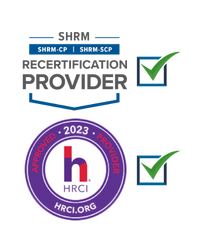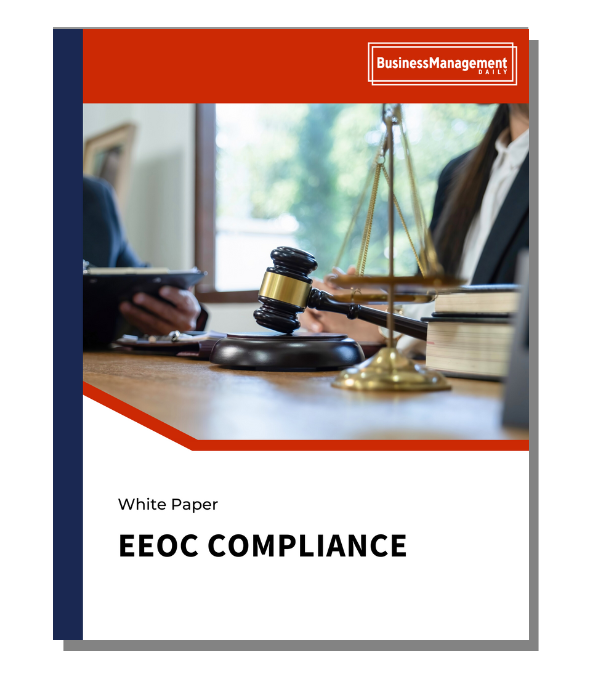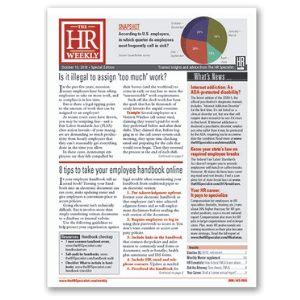September
7
- Thursday, Sept. 7
- 1:00 ET
- 10:00 PT
DEI Pivot: Why Your Workforce Goals Need a Legal Check
Is your DEI program legal?
This 75-minute interactive online training will cover:

Analysis of the Students for Fair Admissions v. Harvard affirmative action decision

Legal review of the state of DEI programs

What the future holds for an inclusive workplace
Legal expert breaks down the Harvard decision and how it impacts your DEI plans
The Supreme Court has outlawed affirmative action in college admissions, writing that “[e]liminating racial discrimination means eliminating all of it.” Harvard University ranked applicants by strict academic standards and then considered race as a final factor to create a diverse student body. Now, employers with diversity, equity and inclusiveness (DEI) policies and programs face uncertain prospects. Already, Fortune 100 employers have received letters from a group of state attorneys general, telling them that diversity “quotas” or race-based preferences in hiring are “immoral” and to expect legal action challenging DEI programs.
Now is the time to proactively address any potential problems with your DEI policies and programs — before a surprise lawsuit by either a zealous state attorney general or a disgruntled applicant or employee. The EEOC, for example, is likely to see a rush of complaints from candidates — sometimes aided by groups like the one created to challenge Harvard’s admissions policies — and employees claiming they were discriminated against by an employer’s DEI hiring practices. And that agency has already said that “poorly structured voluntary diversity programs” pose substantial legal risks. Make sure your DEI practices can stand up to scrutiny so that you don’t end up as an expensive test case.
Finally, realize that the Harvard decision means that in four years’ time, the pool of credentialled and diverse candidates will shrink substantially. That’s because colleges and universities can’t use race in the admissions process moving forward so that the graduating classes will look less diverse and lean more heavily homogenous. Stepping up efforts to cast a wider hiring net now may be the best way to blunt the impact.
Agenda for DEI Pivot
- Learn what the Harvard decision says — and more importantly, what it doesn’t say.
- Why you now need to tie any hiring preferences to a specific, valid business objective — and why goals without timelines or reasons no longer cut it.
- Why consistency in hiring is important — like asking all candidates the same questions and not subjecting some candidates to an additional review before the offer.
- How to audit your DEI recruiting results for potential hidden discrimination against applicants and employees from other protected classifications like age and disability — and how to undo negative impact.
- Why you may want to revamp your overall DEI program to focus on Title VII compliance.
- What constitutes a “poorly structured voluntary diversity program” and how to fix it.
- Why race-based mentoring programs, internships or fellowship positions for employees of diverse backgrounds may be attractive litigation targets, and how to modify those programs.
- How to balance workforce expectations for a diverse workplace with potential liability for hiring and promotion preferences — and retain employees impatient for change.
- Why offering additional support and mentoring to all employees may help maintain a diverse workforce without triggering liability.
- Learn new techniques for recruiting a wider qualified pool of applicants.

Interactive Q&A time included
Anniken will answer any questions about your DEI programs and any potential problems to address with the goal of keeping you out of court.
Anniken Davenport is a noted employment law attorney and the editor of the HR Specialist: Employment Law newsletter series. She has authored several books, including Bullet-Proof Your Employee Handbook and Overtime & Other Tricky Pay Issues, published by HR Specialist. She is a co-author of the upcoming Labor & Employment Law for the 21st Century by Prentice Hall. Anniken has served as a professor at Penn State University, where she taught business law and HR management, and she directed the Legal Studies Program at Wilson College. Her legal career includes representing government units in discrimination and other employment law cases and representing school districts in labor negotiations.
Anniken Davenport Attorney and author

Professional Certification Credit Hours Included With This Webinar
Business Management Daily is recognized by SHRM to offer Professional Development Credits (PDC) for SHRM-CP® or SHRM-SCP® recertification activities.
The use of this official seal confirms that this Activity has met HR Certification Institute’s® (HRCI®) criteria for recertification credit pre-approval.
Register now and receive these free bonuses!

EEOC Compliance
Learn how to stay compliant with EEOC guidelines, address complaints, and most important, what policies will prevent cases from arising in the first place. With this white paper, we'll cover general guidelines, hiring, terminations, hostile work environments, and more.

4 free issues of The HR Weekly
You'll also receive one month of exclusive access to The HR Weekly – our comprehensive service with all the HR advice and compliance tools to simplify your job … and to keep your organization out of court. So that you continue to benefit from The HR Weekly, we will continue your subscription after that for the then current rate, unless you tell us "no, thanks" – your choice.

We promise you'll be satisfied.
If DEI Pivot fails to meet your needs in any way, we will refund 100% of your tuition – every penny you paid – but your course materials and registration bonuses will be yours to keep. No hassles, no questions asked.

